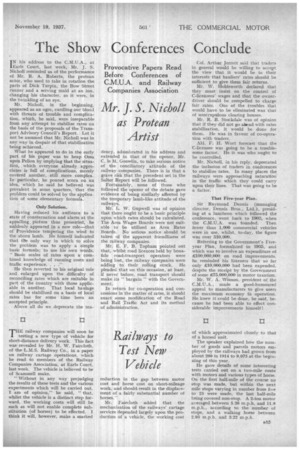The Show Conferences Conclude
Page 17

If you've noticed an error in this article please click here to report it so we can fix it.
Provocative Papers Read Before Conferences of C.M.U.A. and Railway Companies Association
Mr. J. S. Nicholl as Protean Artist
I N his address to the C.M.U.A., at Earls Court, last week, Mr. J. S. Nicholl reminded us of the performance of Mr. R. A. Roberts, the protean actor, who used to take in rotation the parts of Dick Tnrpin, the Bow Street runner and a serving maid at an inn, changing his character, as it were, in the twinkling of an eye.
Mr. Nicholl, in the beginning, appeared as an ogre, curdling our blood with threats of trouble and complication, which, he said, were inseparable from any attempt to stabilize rates on the basis of the proposals of the Transport Advisory Council's Report. Let it not be assumed that Mr. Nicholl was in any way in despair of that stabilization being achieved.
What he appeared to do in the early part of his paper was to heap Ossa upon Pelion by implying that the situation, which everyone already appreciates is full of complications, merely covered another, still more complex. In particular, he poured scorn on an idea, which he said he believed was prevalent in some quarters, that the problem could be solved by the application of some elementary formula.
Only Solution.
Having reduced his audience to a state of consternation and alarm at the appalling picture thus presented, he suddenly appeared in a new role—that of Providence tempering the wind to the shorn lamb. He himself indicated that tile only way in which to solve the problem was to apply a simple basic formula; to use his own words, " Basic scales of rates upon a combined knowledge of running costs and traffic experience. . . ."
He then reverted to his original role and enlarged upon the difficulty of reconciling rates which are suitable in part of the country with those applicable in another. That local haulage should be stabilized on a basis of local rates has for some time been an accepted principle.
Above all do we deprecate the ten dency, adumbrated in his address and extended in that of the opener, Mr. C. le M. Gosselin, to take serious notice of the conciliatory attitude of the railway companies. There is in that a grave risk that the precedent set in the Salter Report will be followed.
Fortunately, none of those who followed the opener of the debate gave evidence of being similarly affected by the temporary lamb-like attitude of the railways.
Mr: L. W. Gupwell was of opinion that there ought to be a basic principle upon which rates should be calculated. The Area Wages Boards were not suitable to be utilized as Area Rates Boards. No serious notice should be taken of the apparent friendliness of the railway companies.
Mr. E, F. B. Topharn pointed out • that, whilst road licences held by bonafide road-transport operators were being lost, the railway companies were adding to their rolling stock. He pleaded that on this occasion, at least, if never before, road transport should make its "bargain " with the Government.
In return for co-operation and concessions in the matter of rates, it should exact some modification of the Road and Rail Traffic Act and its method of administration. Col. Arthur jerrett said that traders in general would be willing to accept the view that it would be in their interests that hauliers' rates should be sufficient to give them fair returns.
Mr. W. Holdsworth declared that they must insist on the control of C-licensees' wages and that the ownerdriver should be .compelled to charge fair rates. One of the troubles that would have to be eliminated was that of unscrupulous clearing houses.
Mr. R. B. Stockdale was of opinion that if they did not go ahead with rates stabilization, it would be done for them. He was in favour of co-operation with traders.
Aid. F. H. Wort forecast that the C-licensee was going to be a troublesome factor. He it was who ought to be controlled.
Mr. Nicholl, in his reply, deprecated the inclusion of traders in conferences
to stabilize rates. In many places the, railways were approaching saturation. in the traffic which they could carry upon their lines. That was going to be a factor.
That Five-year Plan.
Sir Raymond Dennis (managing director, Dennis Bros., Ltd.), presiding at a luncheon which followed the conference, went back to 1903, when the C.M.U.A. was founded. Then fewer than 1,000 commercial vehicles were in use, whilst, to-day, the figure was over 510,000.
Referring to the Government's Fiveyear Plan, forint:dated in 1935, and which was to involve an expenditure of £100,000,000. on road improvements,' he reminded his listeners that so far only £10,000,000 had been expended, despite the receipt by the Government of some £75,000,000 in motor taxation.
Mr. W. A. Vinson, president of the C.M.U.A., made a good-humoured appeal to manufacturers to give users the maximum economy in operation. He knew it could be done, he said, because he had been able to effect considerable improvements himself :




























